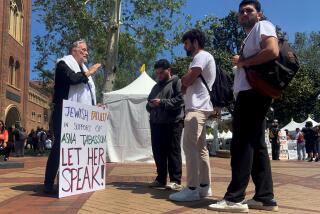ACLU lawsuit accuses Laguna Beach of discrimination against disabled homeless
The American Civil Liberties Union Foundation of Southern California sued the city of Laguna Beach on Thursday, alleging discrimination against homeless people with disabilities.
The suit reignited tension that surfaced seven years ago with another lawsuit.
The latest complaint, filed in U.S. District Court in Santa Ana, seeks to require Laguna Beach officials to provide supportive housing with wraparound services such as mental healthcare and case management, according to a statement on the ACLU website.
The lawsuit also challenges the city’s practice of issuing citations for sleeping or lodging in public to disabled homeless people who cannot access the local emergency shelter.
ACLU attorneys sued on behalf of five chronically homeless people with mental and physical disabilities, including a veteran.
“Laguna Beach is best known as an affluent, idyllic seaside art colony, but a small yet significant portion of the population suffers from mental and physical disabilities that leave them unable to access housing,” said Kristopher Wood, an attorney with Costa Mesa-based law firm Paul Hastings LLP. “The city refuses to provide permanent supportive housing that would alleviate the problem, yet continues to cite physically and mentally disabled homeless individuals who have no other option for sleeping outdoors. That conduct is simply illegal under the ADA [Americans with Disabilities Act] and the [U.S.] Constitution.”
The emergency overnight shelter in Laguna Canyon, called the Alternative Sleeping Location, provides space for 45 beds, plus meals, laundry, showers and van service to Laguna’s bus depot. Officials from the Laguna Beach-based nonprofit Friendship Shelter operate the facility under contract with the city. It is the only municipal year-round shelter in Orange County.
Laguna Beach and Friendship Shelter officials recently agreed to fund a case worker to help connect homeless people with resource providers.
“It is very disappointing to be a target of the ACLU, given the city’s proven track record of being a leader in providing services to the homeless community,” City Manager John Pietig said in a written response to the lawsuit.
“It is well-known that no single public entity can solve the issues associated with homelessness, especially at the local level,” he added.
The ACLU argues that the city provides only limited emergency shelter that is often “inaccessible to persons with disabilities — yet mandates strict enforcement of laws prohibiting sleeping in public, even against those who cannot access this shelter.”
The ACLU and the city have been at odds before.
In 2008, the ACLU challenged a Laguna Beach ordinance that allowed police to ticket homeless people who had no other place to sleep. That case was quickly settled, with the city agreeing to repeal sections of the ordinance that prohibited sleeping or camping in public places. The Alternative Sleeping Location was established following that lawsuit.
ACLU officials want a “program to provide permanent supportive housing within the Laguna Beach city limits sufficient to house the city’s disabled homeless population,” according to the complaint.
The Friendship Shelter and developer Jamboree Housing Corp. last year proposed a 40-unit homeless facility for the chronically homeless in Laguna Canyon but received pushback from residents worried about the safety of tenants wandering close to heavily traveled Laguna Canyon Road and about potential loitering in nearby residential neighborhoods.
Two months ago, Pietig sent a letter to Friendship Shelter officials saying the City Council did not want to pursue a facility in the canyon, Dawn Price, the organization’s executive director, said in a written statement.
“It is the city’s hope that a project will move forward on a more suitable site,” the letter said.
Friendship Shelter officials remain steadfast in identifying a spot for permanent housing geared toward the homeless who need on-site supervision because they can not live independently.
“While safe shelter is a laudable and important first step, the solution to homelessness is housing,” Price said.
The U.S. Department of Housing and Urban Development defines a chronically homeless person as one who lives with a mental or physical disability and has been continually homeless for a year or more or has had at least four episodes of homelessness in the past three years.
Friendship Shelter officials began a permanent supportive housing program last year at scattered apartments throughout Orange County, though none are in Laguna Beach.
Twenty-one people reside in the apartments, and most came from the Alternative Sleeping Location, Price said.
Two San Clemente apartment buildings are being renovated to house 18- to 25-year-olds in permanent supportive housing programs. They are scheduled to open in December.
One central location, not simply separate apartments, remains a primary goal, Price said, noting the cost-effectiveness.
More to Read
Start your day right
Sign up for Essential California for news, features and recommendations from the L.A. Times and beyond in your inbox six days a week.
You may occasionally receive promotional content from the Los Angeles Times.







